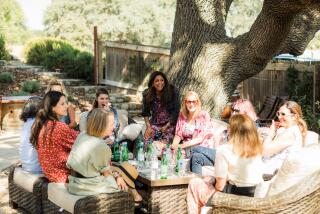A Surge in Maiden Voyages
LODI, Calif. — For a few blustery days in late October, they gathered here from across the nation to show that a woman’s place is in the home--as long as it can be parallel-parked.
Indeed, the first convention of RVing Women, billed as “women’s history in the making,” was perhaps the only event where one could learn cross-stitchery, self-defense and basic diesel mechanics all in one weekend.
Pat Montague cruised up from Huntington Beach in a 24-foot Robin Hood motor home to join 600 sister enthusiasts for the occasion. She credits the 4,000-member club with helping her into the driver’s seat after her husband died in 1993.
“All these women are adventurers at heart,” she said, gesturing to the 300-plus motor homes and campers aligned in neat rows on the Lodi Grape Festival fairgrounds. “I found out I wasn’t the only one.”
Women-only travel, long the stuff of bus tours to distant shopping malls, has quickened its pedestrian pace and is moving into the fast lane.
Rising incomes, delayed marriage, divorce and longer life spans have produced a burgeoning number of women with the means to see the world, but without husband or family to accompany them. Social change and sheer demographics are shattering lingering taboos that once discouraged women from traveling far without a male protector.
Many are going solo, inspired by a crop of new books and magazines spotlighting women’s voices from the road. Other are opting for the camaraderie and safety of groups, hooking up with like-minded women through travel clubs. Still others are turning to a growing number of companies that specialize in women-only vacations.
Fifteen years ago only a handful of such offerings existed. Now, more than 100 companies are designing trips exclusively for sister travelers, often to locations well off the beaten path.
Outfitters with names such as Woodswomen and Dirt Roads and Damsels are taking women into the wilderness to climb mountains, shoot the rapids, cast fly rods and learn other outdoor skills in a supportive environment.
Other tour operators are putting a matriarchal twist on more civilized destinations, focusing on women’s art, history, culture, even religion. These include the upcoming “Goddess Tour” of Hawaii and the English “Wicca/Druid Spiritual Adventure” offered by women-owned Earthwise Journeys of Portland, Ore.
There are lesbian-only getaways, women’s wellness retreats, and cultural exchanges where Westerners can discuss women’s issues with their Third World counterparts.
Then there are firms such as Sebastopol-based Wild Women Adventures, whose feminist sensibility is more on the order of Lucy and Ethel meet Thelma and Louise. Promotional materials for the travel agency’s women-only tours feature owners Carol Rivendell and Martha Lindt decked out in Carmen Miranda regalia, complete with fruit headdresses. Among the offerings in their road show is an excursion to Ireland dubbed “Erin Go Braghless.”
“It can be a transformational experience of just a big ol’ slumber party,” said Rivendell, 49, who has led several of the trips. “The whole point of traveling with other women is to have fun. It’s our turn now.”
*
Author John Gardner once said that in all of literature there are just two stories: going on a journey and a stranger comes to town.
Denied the journey for centuries, women are taking to the road with a vengeance. Females make up about half of all domestic leisure travelers, but experts say more and more of them are traveling without a spouse or family--through circumstance and by choice.
Women hitting the road alone or in the company of other women accounted for 238 million trips in 1995, according to D.K. Shifflet & Associates, a McLean, Va.-based travel research firm.
Lynne Sorensen, a professor of tourism at Canada College in Redwood City, has watched the demographic shift transform the face of eco-tourism and adventure travel over the past decade.
An adventurer setting out for the rain forest or veld today is most likely to be a college-educated woman over 40 traveling without a mate, Sorensen’s research shows.
“They are widowed, divorced, never married or their husband doesn’t share their interest,” she said. “They represent an incredibly powerful market segment. And it’s only going to grow.”
Like the Big Three auto makers, which found themselves peddling gas guzzlers when the oil crunch hit, mainstream travel suppliers are misjudging their market with couples-oriented advertising and pricey singles supplements that make solo travelers feel like pariahs, Sorensen contends.
Enter companies specializing in women-only travel.
Although only a fraction of the $440-billion U.S. travel trade, these enterprises are tailoring their products to partner-less women, and winning a growing following among consumers such as 60-year-old Adela Cruz of San Antonio.
Divorced with grown children, Cruz found herself heading toward retirement and longing to see a bit of the world. An inexperienced traveler, she was leery of going alone or hanging on the sidelines of a conventional group tour. Last year, she worked up the nerve to join nine strangers at Yosemite for a cross-country skiing vacation organized by Groton, Mass.-based Outdoor Vacations for Women Over 40.
Since then, the retired nurse practitioner has attended wilderness survival school, camped in the Grand Canyon, gone scuba diving off Australia’s Great Barrier Reef and is planning a trek in Nepal.
“All those ladies really inspired me,” said the soft-spoken Cruz, who can hardly believe her own transformation. “I never thought I’d be doing all these things. That first trip gave me the confidence.”
*
“For centuries it was frowned upon for women to travel without escort, chaperon or husband,” writes author Mary Morris in the introduction to “Maiden Voyages,” her 1993 compilation of the writings of early women travelers. “To journey was to put oneself at risk.”
Helping women overcome those fears and lingering taboos is one of the principal goals of women-only travel companies and clubs like hers, said Arlene Van Note, RVing Women’s executive director and chief organizer of the Lodi convention.
“Your kids tell you you’re crazy and the neighbors tell you you’re going to get killed,” Van Note said. “But there’s nothing more wonderful than seeing a woman who’s scared to death go out on the road and come back strutting like the queen of the May.”
Founded in 1991 by a pair of recreational vehicle enthusiasts who wanted to socialize with other motoring women, the group sponsors more than 50 rallies and events each year.
Huntington Beach’s Montague tried coed RV organizations, but says she felt like the fifth wheel among their mostly married members. She says she has been welcomed and supported by her counterparts at RVing Women, and that the group’s maintenance classes have helped demystify the hobby’s mechanical side.
Showing a visitor around her motor home at the Lodi fairgrounds, Montague rattled off a laundry list of repairs she has made to her 1977 rig, including fixing the plumbing and patching the roof.
“My husband did all the ‘man’ things before,” she said. “Now it’s a woman’s thing.”
Thalia Zepatos, author of “Adventures in Good Company,” a directory of women’s tours and outdoor trips, said one of the primary benefits of women-only travel is the absence of assigned gender roles.
“There is no assumption about who will sit in the back of the canoe and steer,” Zepatos said. “Women feel free to take risks and make mistakes without fear of embarrassment in an all-woman setting.”
*
Despite the egalitarian merits, perhaps the most difficult challenge of selling women-only trips is overcoming inhibitions many women have about traveling together, said Marion Stoddart, founder of Outdoor Vacations for Women Over 40.
Stoddart, now 68, started her business 13 years ago, partly because she spotted a market niche but also because she wanted to meet women her own age who liked to camp and hike and canoe.
“My husband doesn’t like to travel and I found myself the token older women with other groups,” she said. “I knew there had to be other women out there who shared my interest.”
She said potential customers would express excitement about the trips, only to back out after further consideration. They cited guilt about leaving their families, the need to get their husbands’ permission, or feelings of inadequacy about their skills and physical condition. Many were uneasy about the type of participants such a trip would attract.
“The implication was that there must be something wrong with these other women,” Stoddart said.
In fact, to fill her first horse-packing trip to Yellowstone, Stoddard had to collar prospects at the neighborhood post office. Now, she arranges at least 25 all-women excursions a year to wilderness spots throughout North America and abroad.
She links the growth in women-only travel to wider changes in society and women’s willingness to view themselves as something other than an appendage of a family unit.
Others say women are looking to reconnect with each other outside the buttoned-down confines of corporate America. Power lunches and career networking clubs have all but replaced sewing circles and quilting bees, Rivendell said, but they aren’t nearly as much fun.
“When you leave the loved ones at home and travel with other women you are completely free to reinvent yourself,” she said. “That doesn’t mean going off, getting drunk, picking up guys and ruining your marriage. It’s about letting your hair down and getting to be yourself without any kind of censuring or expectations. Women are just different from men in that way.”
Indeed, the notion that women view their journeys differently than men--advancing inwardly as they venture outwardly--is gaining currency in a host of new publications by women wanderers.
Writers such as Morris, Zepatos and Marybeth Bond have found an enthusiastic audience for women’s voices from the road. Ditto for upstart magazines such as Toronto-based Journeywoman and San Francisco’s Maiden Voyages (no connection to Morris’ book) that target women travelers.
“There is a real hunger for these stories, this kind of information,” said Bond, author of “Travelers Tales: A Woman’s World” and the featured speaker for next year’s first-ever Women’s Travel Expo in San Francisco. “To travel is to take control of your life and your world.”
*
Peg Ciminera’s motor home has been a vehicle for change.
The Newport Beach nurse and her husband had always talked of traveling the country when they retired. When the couple divorced, Ciminera refused to give up on the dream.
She put up a glossy photo of a 24-foot Born Free motor home for inspiration. In 1992, she finally purchased that rig, notwithstanding the fact she had never driven one before.
“My hands were shaking on the steering wheel pulling out of that dealer’s lot,” said Ciminera, 59, relating the tale at the RVing Women convention. “I had no idea what I was doing.”
Now a seasoned traveler, she recently sold her condominium and moved to an RV park to see what it would be like to become a “full-timer” in retirement.
Her mother has branded her a gypsy, but Ciminera says she wouldn’t trade all those desert sunsets, mountain sunrises and miles of open road for house-bound respectability.
Framed in the doorway of her motor home, the autumn sun on her face, she glanced thoughtfully at the vehicle’s logo.
“Born Free,” she murmured with satisfaction. “Just like me.”
More to Read
Sign up for The Wild
We’ll help you find the best places to hike, bike and run, as well as the perfect silent spots for meditation and yoga.
You may occasionally receive promotional content from the Los Angeles Times.






